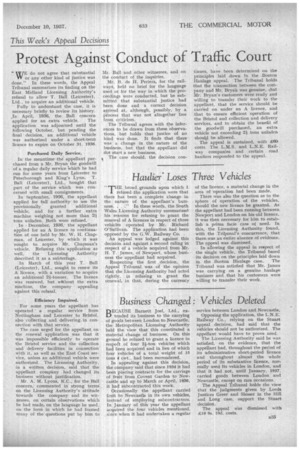Business Changed: Vehicles Deleted
Page 17

If you've noticed an error in this article please click here to report it so we can fix it.
BECAUSE Barnett Joel, Ltd., extended its business to the carrying of goods between London to Newcastle, the Metropolitan Licensing Authority held the view that this constituted a material change of business. On this ground he refused to grant a licence in respeet of four 21-ton vehicles which had been acquired and in lieu of which four vehicles of a total weight of 15 tons 4 cwt., had been surrendered.
In appealing against this decision, the company said that since 1934 it had been placing contracts for the carriage of fruit from Covent Garden to• Newcastle and up to March or April, 1956, it had subcontracted this work.
Occasionally the appellant carried fruit to Newcastle in its own vehicles, instead of employing subcontractors. In January of this year the appellant acquired the four vehicles mentioned, since when it had undertaken a regular service between London and Newcastle.
Opposing the application, the L.N.E. Railway Co., relying on the Stuart appeal decision, had said that the vehicles should not be authorized. The appellant would have to prove need.
The Licensing Authority said he was satisfied, on the evidence, that the appellant had, throughout the period of its administrative short-period licence and throughout almost the whole period of its substantive licence, normally used its vehicles in London, and that it had not, until January, 1937, carried goods between London and Newcastle, except on rare occasions.
The Appeal Tribunal holds the view that the judgments given by Lords Justices Greer and Slesser in the Hill and Long case, support the Stuart decision.
The appeal was dismissed with £16 9s. 10d. costs.




























